Mar 2010
Mar 2010 sadmin2010 WORLD CUP BUYING TICKETS MADE EASIER
2010 WORLD CUP BUYING TICKETS MADE EASIER sadmin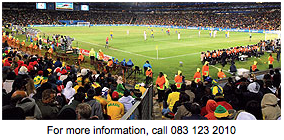 In January, Local Organising Committee (LOC) officials were worried that very few tickets had been bought for the group matches involving our own team, Bafana Bafana.
In January, Local Organising Committee (LOC) officials were worried that very few tickets had been bought for the group matches involving our own team, Bafana Bafana.
Among the reasons mentioned for the slow sales of match tickets was that local fans were not used to the FIFA ticket application method.
This method involved buying tickets using the Internet during specific times or filling in application forms at First National Bank outlets. Fans asked the LOC for a simpler and easier method for ordinary football fans to buy tickets.
Centres
From 15 April, local fans will be allowed to buy match tickets over the counter at ticketing centres to be set up at each of the host cities. Johannesburg will have two ticketing centres and the other cities one each. They are Tshwane (Pretoria), eThekwini (Durban), Cape Town, Mangaung (Bloemfontein), Rustenburg, Mbombela (Nelspruit), Nelson Mandela Bay Metro (Port Elizabeth) and Polokwane.
A total of 600 000 tickets will be sold at the ticketing centres on a first-come, first-serve basis. To qualify for these tickets, you must have a valid South African Identity Document (ID). You can use cash or a credit card.
Remember, if you buy tickets for friends or family, you must have their ID numbers on hand as well.
Local fans
By the end of January, almost two million of the three million tickets available for the tournament had been sold. About 80 per cent of those who applied were local fans.
During the third phase of ticket sales that ended in late January, more than 950 000 local fans had made applications to buy
tickets. The fourth phase for applying for tickets on the Internet or through FNB outlets started on 9 February and will end on 7 April.
- Mbulelo Baloyi
DID YOU KNOW?
By the end of January, apart from South Africa as the host country, the USA led ticket applications for the third phase with 50 217. The UK was second with 41 529, followed by Australia (15 523), Mexico (14 804), Germany (14 647) and Brazil (10 767).
2010 WORLD CUP GOVERNMENT'S SECURITY PLAN FOR WORLD CUP
2010 WORLD CUP GOVERNMENT'S SECURITY PLAN FOR WORLD CUP sadmin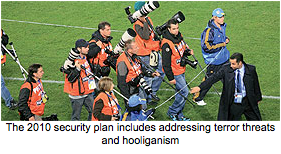 Almost half-a-million visitors are expected in South Africa during the month-long FIFA World Cup between June and July this year. This is the biggest tournament ever hosted by South Africa to date and government is leaving nothing to chance to ensure that it will be safe and secure.
Almost half-a-million visitors are expected in South Africa during the month-long FIFA World Cup between June and July this year. This is the biggest tournament ever hosted by South Africa to date and government is leaving nothing to chance to ensure that it will be safe and secure.
By late November last year, the South African Police Service announced its comprehensive security plan to ensure the safety of visitors during the 2010 FIFA World Cup.
The security plan, which includes addressing terror threats and hooliganism, has been approved by the world's football governing body, FIFA.
Trained officers
Government has set aside about R640 million to employ 41,000 police officers specifically for the event. The figure includes 31 000 permanent members and 10 000 reservists.
"The vast majority of the police deployed for the World Cup will be trained officers with experience in major events," said Police Minister, Nathi Mthethwa.
The security plan was praised by the 2010 FIFA World Cup Inter-Ministerial Committee.
The Committee chairperson, Deputy President Kgalema Motlanthe, said he was satisfied with the overall state of readiness to host a safe and secure FIFA World Cup.
Host cities
The report on Security Arrangements states that plans are being put into operation in all provinces and host cities.
These include training of officers responsible for command and control centres, general policing and crowd control, as well as specialised units responsible for airspace control, organised crime, counterterrorism and human trafficking.
Checking of service providers and training of private security officers employed by the Local Organising Committee is also underway.
Cultural differences
In addition to these safety measures, countries competing in the tournament will also send their own specially trained police officers. They will help with language and cultural differences and will support the South African police.
Each of the 32 qualifying teams is also expected to send at least two trained officers to support the security forces during the tournament.
From the day South Africa won the bid to host the event, preparations started.
During the Confederations Cup in June last year, all required security measures were put into place to ensure a safe tournament.
The Confederations Cup was a forerunner to the World Cup and helped to highlight areas of the security plans that needed further work ahead of the World Cup.
- Mbulelo Baloyi
2010 WORLD CUP LET'S SING OUR NATIONAL ANTHEM WITH PRIDE
2010 WORLD CUP LET'S SING OUR NATIONAL ANTHEM WITH PRIDE sadmin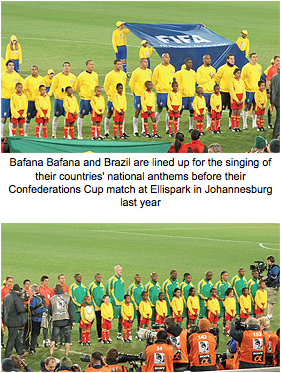 In just a few months time the World Cup will kick off and the eyes of the world will be on South Africa.
In just a few months time the World Cup will kick off and the eyes of the world will be on South Africa.
This is our chance to show the world just how our different cultures, languages and traditions unite us as one strong nation.
What better way to do this than by singing our nation's national anthem with pride. We sing the anthem at special occasions like international sports events and presidential inaugurations. Now we are gearing up to sing it at the 2010 FIFA World Cup.
History
The anthem has a long history behind it.
Before South Africa's first democratic elections in 1994 the country had an official anthem with two versions, namely an Afrikaans version Die Stem and the English version The Call of South Africa.
The unofficial anthem was Nkosi Sikele' iAfrika, which means "God bless Africa." This anthem was a symbol of independence and resistance to apartheid. It was sung by the people at anti-apartheid rallies and gatherings.
United
When our country changed to democracy both anthems were joined. This symbolised the joining of all groups in the country. Today the national anthem is made up of the English, Afrikaans, Sesotho, isiXhosa and isiZulu languages.
The anthem's different languages reflect our country's diverse cultures. It is a tune that brings each and every group in the country together.
At the World Cup, all South Africans will stand tall and sing the anthem with pride in their hearts.
So lets learn the anthem and show the rest of the world what it really means to be proudly South African!
- Samona Murugan
Nkosi Sikelel' iAfrika was composed in 1897 by Enoch Sontonga, a Methodist mission school teacher. The words of the first verse were written in isiXhosa as a hymn. Seven additional verses in isiXhosa were later added by the poet Samuel Mqhayi. A Sesotho version was published by Moses Mphahlele in 1942.
Nkosi Sikelel' iAfrika (God Bless Africa)
Maluphakanyisw' uphondo lwayo, (Raise high her glory)
Yizwa imithandazo yethu, (Hear our prayers)
Nkosi sikelela, thina lusapho lwayo. (God bless us, we her children.)
Sesotho
Morena boloka setjhaba sa heso, (God protect our nation)
O fedise dintwa le matshwenyeho, (End all wars and tribulations)
O se boloke, O se boloke setjhaba sa heso, (Protect us, protect our nation)
Setjhaba sa South Afrika, South Afrika (Our nation South Africa, South Africa)
Afrikaans
Uit die blou van onse hemel, (Ringing out from our blue heavens)
Uit die diepte van ons see, (From the depth of our seas)
Oor ons ewige gebergtes, (Over our everlasting mountains)
Waar die kranse antwoord gee. (Where the echoing crags resound)
English
Sounds the call to come together,
And united we shall stand,
Let us live and strive for freedom,
In South Africa our land.
2010 WORLD CUP THE WELCOMING FLAGS ARE FLYING
2010 WORLD CUP THE WELCOMING FLAGS ARE FLYING sadmin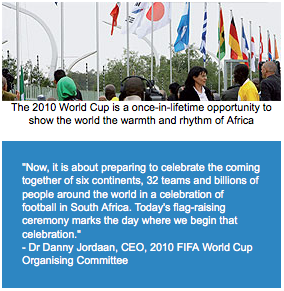 In less than 100 days, thousands of foreigners will visit our country for the biggest football event in the world. Let us welcome these visitors with open arms and make them feel at home. You can do this by saying: "Hallo, welcome to South Africa" in some of the different languages spoken by our visitors. You may not be able to pronounce all the words correctly, but at least they will know that you tried. So, let us teach you how.
In less than 100 days, thousands of foreigners will visit our country for the biggest football event in the world. Let us welcome these visitors with open arms and make them feel at home. You can do this by saying: "Hallo, welcome to South Africa" in some of the different languages spoken by our visitors. You may not be able to pronounce all the words correctly, but at least they will know that you tried. So, let us teach you how.
November last year marked a major highlight in the preparations for this year's FIFA World Cup. The 2010 Organising Committee welcomed participating countries to Africa's first FIFA World Cup with a symbolic flag-raising ceremony featuring all the participating countries' flags.
Marking a highlight in African sporting history, South Africa as the 2010 World Cup host nation, joined the other 31 qualifying countries as the flags of all 32 participating teams were raised in celebration.
The ambassadors and embassy representatives of the 32 countries raised their flags outside SAFA House in Johannesburg. This is just metres away from the Soccer City stadium where the opening match will be played on 11 June and the final match on 11 July.
African giants
All the major countries in world football have qualified for the tournament, as well as a number of countries that may surprise football fans with their performances.
"We congratulate all the teams that have now qualified for the 2010 FIFA World Cup. For us this is a very emotional day," said Dr Danny Jordaan, Chief Executive Officer of the 2010 FIFA World Cup Organising Committee, South Africa.
"After all the years of hard work that have gone into preparing for this momentous event, it is now a reality," he said.
"We're particularly delighted that the giants of African football, Cameroon, Nigeria, Ghana, Ivory Coast and Algeria, join hosts South Africa in what is a formidable line-up of African participants", Jordaan said.
Beautiful cathedrals
He added that it was no longer a case of asking whether the stadiums would be ready. "They are ready and they will be beautiful cathedrals, which will host the best footballers in the world."
The final line-up of the countries who have qualified for the 2010 FIFA World Cup is: Nigeria, Cameroon, New Zealand, Japan, the Netherlands, Korean Republic, Korea DPR, Australia, the USA, Brazil, Ghana, England, Paraguay, Spain, Denmark, Ivory Coast, Chile, Germany, Italy, Mexico, Serbia, Switzerland, Argentina, Honduras, Slovakia, Algeria, Portugal, France, Slovenia, Greece, Uruguay and South Africa.
- Mbulelo Baloyi
Algeria:
Arabic is the official language of these people from northern Africa. To welcome visitors from these countries, say: "Assalamu-alaikum! or Marhaba!"
Slovenia:
Slovenian is the official language spoken in Slovenia. You can welcome them with: "Pozdravljeni, Dobrodosli v Juzno Afriko"
Argentina, Chile, Honduras, Mexico, Spain, Paraguay and Uruguay:
Spanish is spoken in these countries To welcome visitors from these countries, say: "Hola, Bienvenidos a Sudáfrica"
Brazil, Portugal and Angola:
Portuguese is spoken in these countries. You can greet them by saying: "Ola, Bem-vindo a Africa do Sul"
Denmark:
People of Denmark speak Danish. This is how you say "Hello, welcome to South Africa" in Danish: "Hej, Velkommen til Sydafrika"
France, Ivory Coast, Cameroon and Switzerland:
French is spoken by people who live in these countries. You can greet them by saying: "Bonjour, Bienvenue en Afrique du Sud."
Germany and Switzerland:
You can welcome people from these countries in German. Welcome them by saying: "Hallo, willkommen in Südafrika"
Greece:
Greek is the language spoken by the people of Greece. You can greet them by saying: "Geia sas, Kalos Ilthate stin Notio Afriki"
Italy:
Italian is spoken by the people of Italy. Welcome the Italians by saying: "Ciao, bevenuto in Sud Africa"
Japan:
Japanese is the official language of Japan. Welcome the Japanese by saying: "Kon'nichiwa, yokoso minamiafurika kyowa koku"
Korea DPR and Korean Republic:
Both of these countries speak Korean. Welcome the Korean people by saying: "Annyeonghaseyo, nam-a peulika gonghwaguge osin geos-eul hwan-yeonghabnida"
The Netherlands:
The Netherlands: Dutch is the language spoken in the Netherlands. Welcome them by saying: "Hallo, Welkom bij Zuid-Afrika."
Serbia:
Serbian is the official language of this country. Welcome visitors from these countries with: "Poštovani, Dobrodošli u JužnoJ Africi."
Slovakia:
The Slovakian people speak Slovak. Greet them with a simple: "Dobrý deň, vitajte v Južnej Afrike."
2010 WORLD CUP WALK IT, TALK IT, WEAR IT, SHARE IT!
2010 WORLD CUP WALK IT, TALK IT, WEAR IT, SHARE IT! sadmin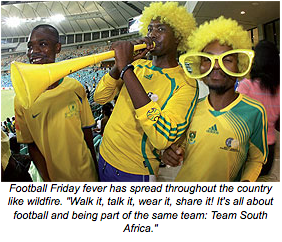 Government and the 2010 World Cup Organising Committee started the Football Friday campaign in September last year to build up excitement leading to the World Cup.
Government and the 2010 World Cup Organising Committee started the Football Friday campaign in September last year to build up excitement leading to the World Cup.
Bafana Bafana
with every Friday bringing about a display of colours as South Africans sport football jerseys, T-shirts, caps and flags.
If you haven't joined in yet, get into the spirit of the beautiful game by showing your true colours as a supporter of South African football. Wear a football jersey every Friday, especially the colours of our national team, Bafana Bafana.
Spread the message
Companies, businesses, schools and community organisations have encouraged their employees and supporters to join in the Football Friday fun.
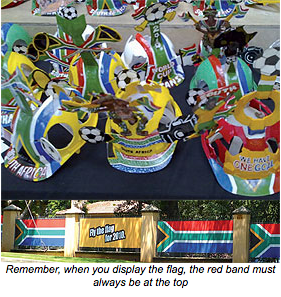 You can also encourage your friends, families and communities to get involved in spreading the Football Friday message. By wearing your country's football kit or colours, you show the world that as the host country we are proud of our team and our country.
You can also encourage your friends, families and communities to get involved in spreading the Football Friday message. By wearing your country's football kit or colours, you show the world that as the host country we are proud of our team and our country.
Fly the flag
Apart from wearing our country's football colours on Fridays, South Africans are also encouraged to fly our beautiful flag whenever and wherever they can.
Thousands of hand-held flags are being handed out to communities across the country during road shows organised by government. This enables South Africans to fly and display the country's flag proudly ahead of the World Cup.
Show your commitment
Many businesses across the country are taking the campaign a step further and are decorating their offices and buildings with the South African flag.
Some companies are displaying massive South African flags and are challenging others to follow their example. People are also displaying the flag on their car doors or flying it from their aerials.
All this enthusiasm has taken the Fly the Flag campaign to new heights, showing the world we are united in our commitment to host an unforgettable World Cup.
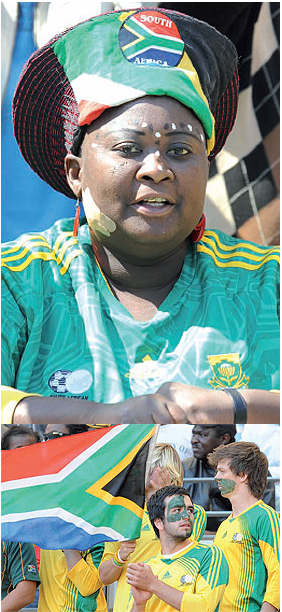
Show your commitment and be a proudly South African 2010 ambassador. Spread the word of Football Friday and fly the flag with pride.
- Samona Murugan
Be a 2010 ambassador
Every South African can show the world what ubuntu really means by being a 2010 World Cup ambassador.
- Be a good host and be friendly and helpful to all visitors.
- Explain local words to visitors and help them when they are lost.
- If you're not a soccer fan yet, get excited by following international and local football games. Watch the games with friends and family. It's a fun way of getting to know the sport, as well as firing up some excitement for the World Cup.
365 DAYS NO VIOLENCE EVERY DAY OF THE YEAR
365 DAYS NO VIOLENCE EVERY DAY OF THE YEAR sadmin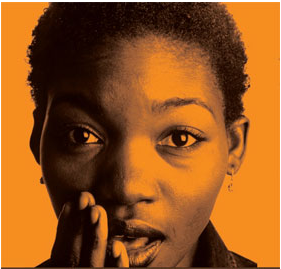 Last year was the tenth anniversary of government's campaign 16 Days of Activism for no Violence Against Women and Children. Government is now set to fight violence and abuse every day of the year.
Last year was the tenth anniversary of government's campaign 16 Days of Activism for no Violence Against Women and Children. Government is now set to fight violence and abuse every day of the year.
The campaign for no violence against women and children is held all over the world between 25 November and 10 December each year.
In South Africa, government will now work with non-governmental and community-based organisations to ensure no violence every day of the year. The new campaign is known as 365 Days of No Violence Against Women and Children.
Summit
The Department of Women, Children and Persons with Disabilities held a summit last year to look at measures needed to support the new awareness campaign.
The summit discussed ways to change the behaviour of abusers and reducing the number of abuse cases.
Human dignity
Restoring the human dignity of victims is an important part of the 365 Days campaign.
Measures are already in place to re-start specialised police units to deal with domestic and sexual crimes. The specialised units will help to attract police officers who have knowledge of how to handle such crimes. These officers have the necessary experience and skills to properly investigate cases of abuse against women and children.
Courts
As the campaign is carried out throughout the year, government will also give more power to the courts to focus on victims' needs.
This will include investigating officers working closely with survivors when bail applications are considered. Survivors will get support if the abusers are released on bail, especially because the accused is often known to the victim.
Rape survivors
Government will also make rape survivors aware of their rights in line with the Sexual Offences Amendment Act. For example, their right to request compulsory HIV testing of the offender within 90 days of the offence.
Government will also ensure that rape survivors get medication immediately after being exposed to possible HIV infection. This includes ensuring that antiretroviral drugs are always available to rape survivors.
Care centres
The Department of Women, Children and Persons with Disabilities will also ensure that victim empowerment services are made available to the victims of sexual assault.
There are 17 Thuthuzela Care Centres across the country in areas with high incidents of sexual violence. These centres provide health, welfare and support services in a dignified and caring environment by qualified professionals.
- Mbulelo Baloyi
For more information on Thuthuzela Care Centres, contact the National Prosecuting Authority: 012 845-6000.
AGRICULTURE CHARCOAL LEADS TO FARMING SUCCESS
AGRICULTURE CHARCOAL LEADS TO FARMING SUCCESS sadmin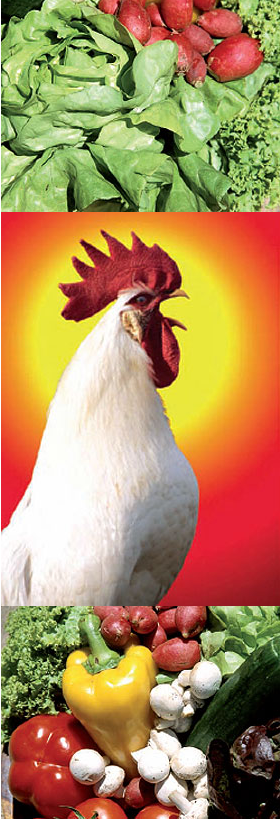 A group of 37 farmers in Middelburg, Mpumalanga, struggled for many years to make their dream of running a successful farm come true. The Nkangala District municipality came to their rescue by giving them a tank, a tractor, a bakkie and farming tools.
A group of 37 farmers in Middelburg, Mpumalanga, struggled for many years to make their dream of running a successful farm come true. The Nkangala District municipality came to their rescue by giving them a tank, a tractor, a bakkie and farming tools.
Start-up funding
Never once did the Lefata farmers think of manufacturing charcoal; it started by pure chance.
They dreamed of turning their farm into a rose farm, a poultry farm or a vegetable farm. They eventually decided to start a crop plantation and approached the Department of Social Services for start-up funding.
One day while preparing to plant vegetables, a local businessman approached them. He advised them to use their trees to farm charcoal.
Tonnes of charcoal
It sounded like a good idea and they knew there was always a need for charcoal. Today, they sell tonnes of charcoal in Piet Retief and plans are in place to start selling throughout the country.
Their charcoal business, which started operating in May last year, taught them that charcoal manufacturing is a tiresome and complex process. Thirty of the members work in 12-hour shifts.
The trees are first cut to size and then loaded into a charcoal-manufacturing kiln (a large industrial oven). They are baked in the kiln for 24 hours. The kiln is then turned off and the wood is left to cool off for 18 to 24 hours.
During this time it turns into chunks of charcoal. The charcoal is packed into bags and transported to the market to be sold.
Crops and poultry
After the success of the charcoal business, the group decided to make their other dreams, namely starting a crop farm and a poultry farm, come true.
Their success helped them to get funding from the Department of Social Services. They are now preparing the land to plant cabbage, onions, carrots, beetroot and cauliflower.
More good news came when the group received a broiler for their poultry business from the Department of Agriculture, Rural Development and Land Administration.
Higher goals
The poultry farming started in September last year with almost 40 000 chicks.
After successfully getting three businesses off the ground, the group continues to reach for higher goals. One of them is to start a goat-farming business this year.
- Samona Murugan
Affordable housing for all
Affordable housing for all sadmin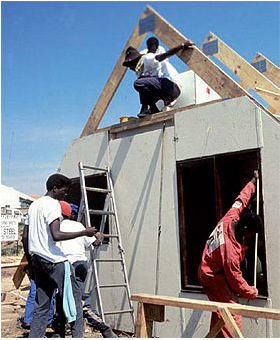 Government plans to upgrade 500 000 shacks in informal settlements by 2014, through the provision of basic services and land tenure rights. There are currently 2 700 informal settlements across the country with 1,2 million households. The new plan is to upgrade 125 000 informal settlement units every year over the next four years through the National Upgrading Support Programme. It is part of government's aim to step up the delivery of affordable housing for all.
Government plans to upgrade 500 000 shacks in informal settlements by 2014, through the provision of basic services and land tenure rights. There are currently 2 700 informal settlements across the country with 1,2 million households. The new plan is to upgrade 125 000 informal settlement units every year over the next four years through the National Upgrading Support Programme. It is part of government's aim to step up the delivery of affordable housing for all.
Government also aims to boost the number of rental housing units, by offering more housing finance. Government will set aside 6 000 hectares of land situated near city centres for affordable housing. The Affordable Rental Housing Programme also aims to increase the rate of affordable rental housing delivery to 300 000 units per year by 2014.
- BuaNews
BIRTH CERTIFICATES BIRTHS REGISTERED AT HOSPITALS TO FIGHT FRAUD
BIRTH CERTIFICATES BIRTHS REGISTERED AT HOSPITALS TO FIGHT FRAUD sadmin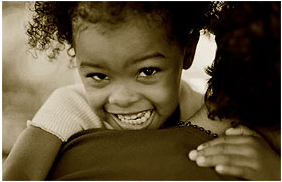 The illegal registration of births of foreigners in South Africa is a serious threat to our country's national security. Illegal registrations have been taking place when foreigners applied for late registration of birth. Through illegal registration of birth, foreigners.
The illegal registration of births of foreigners in South Africa is a serious threat to our country's national security. Illegal registrations have been taking place when foreigners applied for late registration of birth. Through illegal registration of birth, foreigners.
Population register
Through illegal registration of birth, foreigners have been falsely added to the South African population register. This has resulted in them getting identity documents and passports, which have allowed them to illegally access social grants.
By the end of February, the Department of Home Affairs had completed more than
112 000 applications for late registration of births. By the end of this year, the department hopes to stop late registrations completely.
National campaign
Government will now make sure that newborn babies are issued with birth certificates before they leave the hospitals where they are born. This will ensure a South African population register that reflects only people who are legally South Africans.
Government, through the Department of Home Affairs, has started a massive national campaign for the registration of births.
More details
The shortened birth certificates that are presently issued when babies are born will be changed.
These birth certificates do not have any details of the parents. They only show the baby's name certificates and a number which eventually becomes the child's ID number. As a result, the system is abused, because people can use anyone's name and a false number on the certificate and then apply for an ID document.
The department now plans to change birth certificates to include more information like the mother's full details to enable officials to check if the mother is South African.
Schools
For the next three years, the Department will be visiting primary schools to make sure that every child under the age of 15 is registered.
This will help the department in future as it will have proof that the children are on its population register. It will also be proof that the child is real and not just a name on a birth certificate.
Fingerprints
The possibility of taking fingerprints before the age of 16 is also being considered. These fingerprints will be placed on the population register. Once the fingerprints are on the register, first-time ID applicants will be able to use their thumb-print to check if they are on the register.
- Mbulelo Baloyi
To prevent the illegal issuing of birth certificates and identity documents, government has started to issue newborn babies with birth certificates at the hospitals where they are born. This service is currently only available at government hospitals, but will be extended to private hospitals in future.
CALL CENTRES OTHER GOVERNMENT HOTLINES YOU CAN CALL
CALL CENTRES OTHER GOVERNMENT HOTLINES YOU CAN CALL sadmin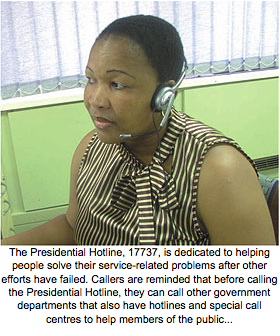 Special hotlines and call centres at government departments can help to reduce the high volume of calls directed to the Presidential Hotline. At these call centres, the particular departments can handle complaints directly.
Special hotlines and call centres at government departments can help to reduce the high volume of calls directed to the Presidential Hotline. At these call centres, the particular departments can handle complaints directly.
Land rights
One such hotline is that of the Department of Rural Development and Land Reform. The department set up a special toll-free line to increase awareness of land rights and occupation security for people living on commercial farms.
This hotline was set up during the launch of the Land Rights Awareness Campaign. It was started to make it easier for members of the public to get information and service from the department.
Illegal eviction
The hotline can also be used to report any land rights abuse, particularly illegal evictions or other threats. This is a free service for people on commercial farms who cannot afford to make paid telephone calls when reporting incidents of illegal eviction, land rights violations and other problems related to their tenure security on farms.
The call centre is situated at the national office of the Department of Rural Development and Land Reform. It has direct links to provincial offices and district offices.
Callers are linked to these offices by the call centre agents who are fully trained to handle land rights and tenure security matters. The call centre, which can answer queries in all official languages, operates from Mondays to Fridays.
Calls to the hotline can be made by farm workers, as well as anyone who witnesses or are aware of any land rights violations of any nature, including illegal eviction.
Home Affairs
The Department of Home Affairs has a call centre, as well as a dedicated hotline to the Minister of Home Affairs. The ministerial hotline enables the minister to attend to problems reported by members of the public after they tried to resolve them with other sections of the department.
The ministerial hotline is operational every day of the week and has voice-recording facilities to allow members of the public to leave voice messages.
It does not replace the department's normal call centre number, which continues to deal with queries from the public.
- Mbulelo Baloyi
-
Department of Home Affairs call centre:
0800 6011 90 -
Department of Home Affairs ministerial hotline:
0800 2044 76 -
Department of Rural Development and Land Reform call centre:
0800 007 095 -
Department of Health Aids helpline:
0800 012 322 -
Department of Defence and Military Veterans' toll-free crime line:
0800 222 091
CARTOON STRIP EPISODE 4: IMBIZO JUNCTION WHEN THE GOING GETS TOUGH
CARTOON STRIP EPISODE 4: IMBIZO JUNCTION WHEN THE GOING GETS TOUGH sadmin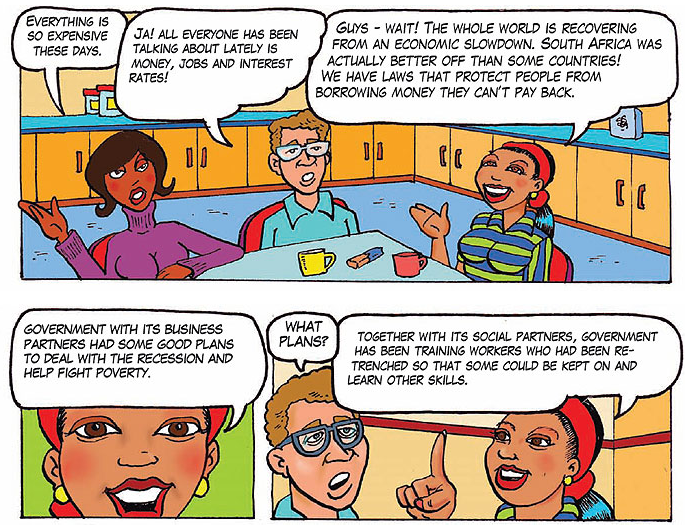
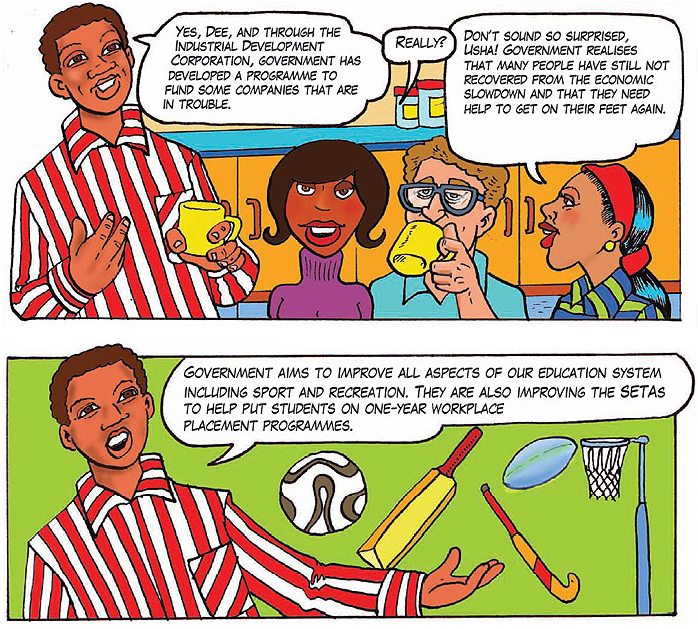
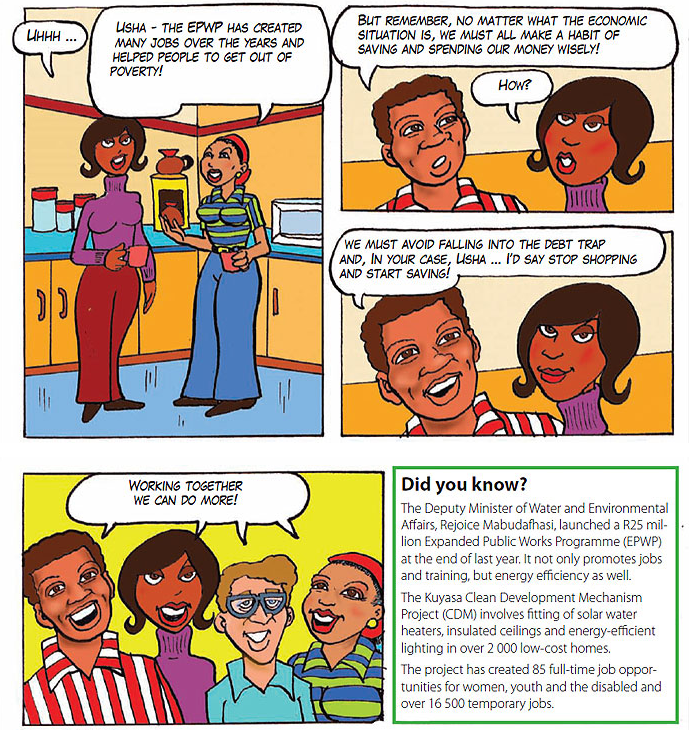
EXPANDED PUBLIC WORKS PROGRAMME (EPWP) KAMOSO AWARDS: Recognising innovative excellence
EXPANDED PUBLIC WORKS PROGRAMME (EPWP) KAMOSO AWARDS: Recognising innovative excellence sadmin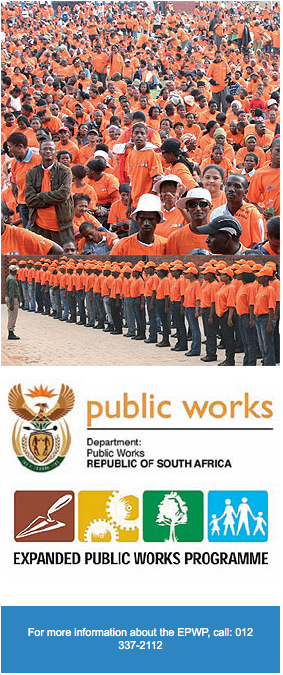 The Expanded Public Works Programme (EPWP)
The Expanded Public Works Programme (EPWP)
The Department of Public Works recognises excellence in the implementation of the Expanded Public Works Programme (EPWP) through the annual Kamoso Awards.
The awards recognise excellence in the following threesectors:
- Infrastructure
- Social
- Environment and Culture
The 2009 Kamoso Awards were successfully hosted in November with the introduction of a new category, namely:
Best Innovation Project in all the sectors.
The Kamoso Awards recognises the important fact that the basic thrust of our government is to improve the general socio-economic conditions of our people. As a result, the effective implementation of the EPWP is at the core of this national project.
The Kamoso Awards serve to highlight the growth of the EPWP as one of the most important forms of unemployment insurance and social protection.
The Kamoso Awards were launched in 2004 to reward national, provincial, local government and public bodies that excelled in implementing the EPWP.
Who qualifies?
- all implementers of EPWP projects throughout South Africa
- any national, provincial or local government, as well as state-owned enterprises implementing EPWP
- any implementer in all four sectors can enter or be nominated.
EXPANDED PUBLIC WORKS PROGRAMME (EPWP) REDUCE UNEMPLOYMENT AND BE A WINNER
EXPANDED PUBLIC WORKS PROGRAMME (EPWP) REDUCE UNEMPLOYMENT AND BE A WINNER sadmin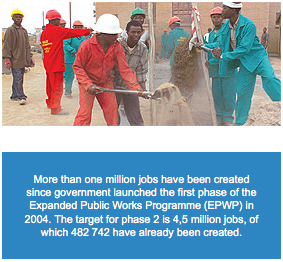 In his first State of the Nation Address in June 2009, President Jacob Zuma promised that the EPWP would create 500 000 work opportunities by December 2009. This was just a fraction of the 4,5 million work opportunities that have to be created in the next five years up to 2014.
In his first State of the Nation Address in June 2009, President Jacob Zuma promised that the EPWP would create 500 000 work opportunities by December 2009. This was just a fraction of the 4,5 million work opportunities that have to be created in the next five years up to 2014.
In addition to fighting poverty and creating jobs, government has been able to maintain infrastructure through the EPWP. This also helped to transfer skills and create work opportunities for unemployed people.
Government started the Kamoso Awards (Kamoso is seSotho for 'future') to identify and reward people and organisations that have carried out government's EPWP job-creation programme with excellence.
Three sectors
The finalists chosen last year are from three sectors, in different categories. These sectors are Social, Infrastructure and Environment and Culture.
KwaZulu-Natal came out tops as the best province. This was in recognition of the different EPWP projects in progress in the province. These include the Zibambele Road Maintenance Project run by the province's Department of Transport, the Asbestos Cement Water Relay and the Platt Estate Invasive Alien Species Clearing Project.
Doing it ourselves
The main aim of the Zibambele (isiZulu for 'doing it ourselves') Project is to provide job opportunities for households headed by women. These women are given training skills in literacy and road maintenance. They are then employed to do maintenance of rural community access roads.
The Asbestos Cement Water Relay Project involves the replacing of thousands of kilometres of asbestos cement water pipes in the eThekwini Municipality.
The Limpopo province won some awards in the Social sector. These include the Manyeleti Youth Academy in the category for best innovative projects. The academy helps to give skills to young people who have been classified as youth in conflict with the law (previously known as juvenile offenders). A women-run co-operative providing meals as part of the school nutrition project also won an award in this category.
Greening projects
The City of Johannesburg won an award in the Environment and Culture sector for various greening projects by City Parks. These include 2010 Legacy Projects, which saw thousands of trees planted in Soweto and other parts of Johannesburg.
- Mbulelo Baloyi
FLY THE FLAG!
FLY THE FLAG! sadminA free flag for you to print and cut out. Display it wherever you can. Remember the red band is always on top...
FUN PAGE WORLD CUP FACTS AND FUN...
FUN PAGE WORLD CUP FACTS AND FUN... sadminPLEASE NOTE:
The games on this page are not a competitions. They are only for fun, so don't send your answers to Vuk'uzenzele.
Blow your vuvuzelas, wear your makarapas, cheer for Bafana Bafana and fly the flag with pride. The long awaited 2010 World Cup, is almost here at last! Below are some World Cup facts and figures. Read about them and do the quizzes on this page.
Did you know?
- The first World Cup soccer match in the world kicked off on 13 July, 1930 with France winning 4-1 against Mexico.
- There was a total of 13 teams in the first World Cup and the host country was Uruguay. Other teams were Argentina, Belgium, Brazil, Bolivia, Chile, France, Mexico, Paraguay, Peru, Romania, the United States and Yugoslavia.
- South American and European countries have won the World Cup nine times. No other continent has produced a World Cup Champion.
- Italy won the 2006 World Cup, which was played in Germany.
- The 2010 World Cup is the first ever to be played on the African continent.
- The name of the 2010 mascot is Zakumi. The first World Cup mascot, created for the 1966 World Cup in England, was called World Cup Willie.
Find the hidden words
The words below are hidden in the grid. See if you can find them, then circle them like the word "FAN". They can go from top to bottom, down or across or diagonally.
The words are: SOCCER, PLAYER, ANTHEM, CUP, BALL, FLAG, STADIUM.
Print the image below to complete this game...
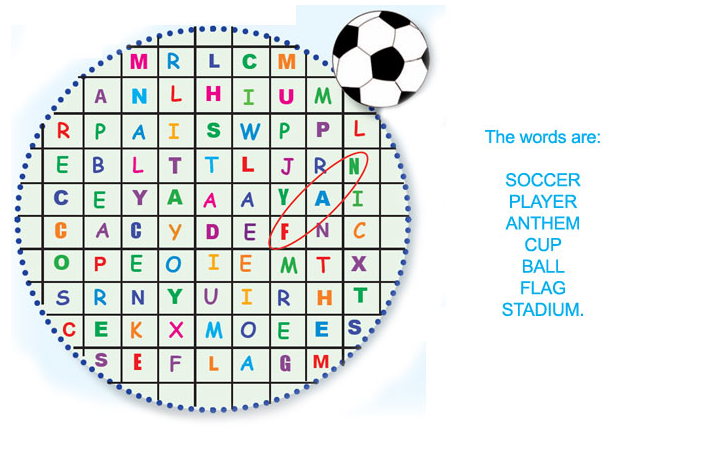
Fill in the Missing Words
Complete the sentences by filling in the missing words.
Print the image below to complete this game...
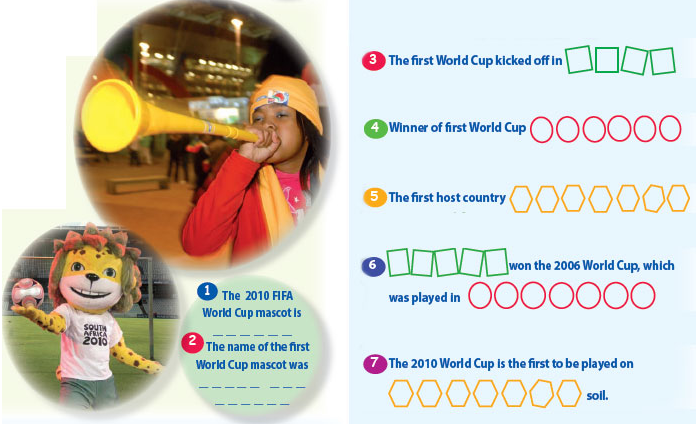
HEALTH YOU CAN PREVENT MALARIA
HEALTH YOU CAN PREVENT MALARIA sadmin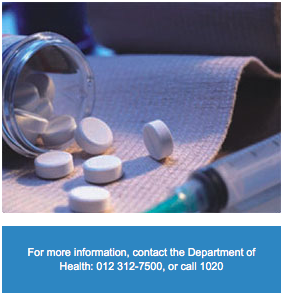 Hundreds of malaria cases have been reported in the Limpopo province since January. Certain areas in this province, as well as in Mpumalanga, and KwaZulu-Natal are known as high risk areas. If you travel to these areas, make sure you get medication to prevent malaria.
Hundreds of malaria cases have been reported in the Limpopo province since January. Certain areas in this province, as well as in Mpumalanga, and KwaZulu-Natal are known as high risk areas. If you travel to these areas, make sure you get medication to prevent malaria.
Communities in Vhembe, Mopani, Giyani and Ba Phalaborwa in Limpopo have recently been seriously affected by malaria. This disease is also a problem in Mpumalanga and KwaZulu-Natal, as well as in certain parts of the North West province, especially from October to May.
Mosquitoes
Malaria is an infectious disease spread by mosquitoes that carry the Plasmodium parasite. There are four species of this parasite. The most serious one is Plasmodium falciparum, which can be life-threatening.
When an infected mosquito stings you, it injects the malaria parasites into your blood. The disease kills over a million people every year, mostly in Africa.
To help communities in malaria regions, the Department of Health has formed 42 malaria teams around the country.
The teams visit areas affected by malaria and spray all the inside walls of homes to stop the mosquitoes from entering. So far more than 68 000 homes have been sprayed.
Symptoms
to malaria mosquitoes and you have any of the following signs of the disease, you must visit a clinic or doctor as soon as possible:
- shaking and chills
- high fever and sweating
- constant tiredness
- headaches or dizziness
- nausea and vomiting
- stomach cramps
- dry cough
- muscle or joint pain.
Malaria kills over a million people every year. Always take precautions when you visit a high-risk malaria area
Malaria patients also suffer from attacks, which can take place every second or third day.
Malaria can take up to 60 days to break down your immune system, so even if you do not feel ill immediately, visit your local doctor or clinic for a check-up if you have visited malaria risk areas.
What you can do
You can take the following precautions to protect yourself from malaria.
- Before you travel to high-risk malaria areas, get anti-malaria medication from your doctor or clinic.
- To help keep mosquitoes away, apply mosquito repellent gel on your skin, sleep under a mosquito-proof bed-net, spray sleeping areas with mosquito repellent and wear clothing that cover most of the body so you don't get bitten.
- Visit your doctor or clinic immediately if you have signs of the disease - it can be deadly if it is not treated in time.
- Visit your doctor or clinic often for check-ups.
- Samona Murugan
HIGHER EDUCATION THERE'S HOPE FOR THOSE WHO DID NOT GET INTO UNIVERSITY
HIGHER EDUCATION THERE'S HOPE FOR THOSE WHO DID NOT GET INTO UNIVERSITY sadmin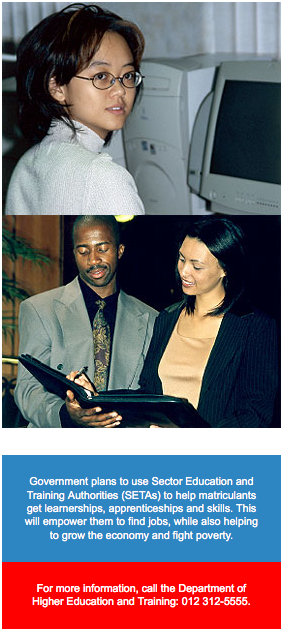 Young people today often struggle to find jobs after they have matriculated. To help them improve their skills to enter the job market, the Department of Higher Education and Training is starting learning programmes, targeting matriculants who failed to meet university entrance requirements.
Young people today often struggle to find jobs after they have matriculated. To help them improve their skills to enter the job market, the Department of Higher Education and Training is starting learning programmes, targeting matriculants who failed to meet university entrance requirements.
An amount of R500 million has been set aside as a contribution towards this special project.
This follows the transfer of SETAs last November from the Department of Labour to the newly created Department of Higher Education and Training.
Skills Fund
The focus will be on partnerships with the National Skills Fund (NSF) to make more learnerships available in areas where there are skills shortages.
These include information, communication and technology, engineering, science and health.
In addition, skills development programmes will be started with the sole aim of giving skills to the unemployed to make it easier for them to find jobs.
Small businesses
The SETAs will recruit 35 000 learners into these programmes during this year. A further 2 500 will receive opportunities to get skills that will help them create their own new small businesses.
The department is responsible for higher education institutions like universities and universities of technology, as well as further education and training (FET) colleges, trade testing centres and skills-development institutes.
Second chance
The FET colleges will play an important role in giving second chance education to those learners who do not manage to pass matric.
These colleges together with SETAs will link with the business sector and industries to involve employers and businesses more meaningfully.
To achieve this, the department will help FET colleges to find and hold onto highly skilled and experienced instructors.
Rural areas
As part of government's goal to develop rural areas, FET colleges will be strengthened with things like better resources to help them address problems affecting skills development.
Agricultural training colleges in rural areas will develop and run training programmes to support rural economies. This will include the training of farm workers.
- Mbulelo Baloyi
IMPROVING THE PUBLIC SERVICE SERIOUS ABOUT ROOTING OUT CORRUPTION
IMPROVING THE PUBLIC SERVICE SERIOUS ABOUT ROOTING OUT CORRUPTION sadminAn anti-corruption inter-ministerial committee has been set up to fight corruption in the Public Service. The committee, which is made up of ministers from different government departments is proof of government's commitment to rooting out corruption.
Strengthening the fight against corruption is one of the new administration's major tasks. A number of reports have shown that many incidents of corruption in different sectors of the Public Service have been taking place.
Government views corruption in the Public Service as a very serious offence as it damages our country's standing in the world. It can also damage our economy, because foreign investors do not want to invest in a country where corruption is widespread.
Committee
The setting up of an inter-ministerial committee follows an undertaking by the new administration to stamp out corruption. The Minister in the Presidency, Mr Collins Chabane, will chair the committee.
Members will include the ministers of Public Service and Administration, Finance, Cooperative Governance and Traditional Affairs, and Social Development. It will also include representatives from the Justice, Crime Prevention and Security (JCPS) Cluster.
They will study reports and recommendations on corruption issued by the Public Service Commission, as well as other bodies.
The committee will ensure that action is taken against all persons who are involved in corrupt practices involving public finances.
However, government also realises that for corruption to take place in the public service, there are companies in the private sector who pay bribes to public officials.
Private sector
In this regard, government has warned all private sector companies that are involved in corrupt practices like paying bribes to public officials, that action will be taken against them.
A stern warning was also given to civil servants that 'strong action' would be taken against those guilty of corruption. The committee wants to make sure that action is taken to deal with corrupt practices and that those responsible for corruption are charged.
It aims to improve perceptions about the Public Service and to restore the confidence of the people in the Public Service.
Tough action
By taking tough action against those involved in corruption, government is committing itself to act upon promises made to the people to root out corruption.
- Mbulelo Baloyi
INTERNATIONAL RELATIONS REACHING OUT TO HAITI
INTERNATIONAL RELATIONS REACHING OUT TO HAITI sadmin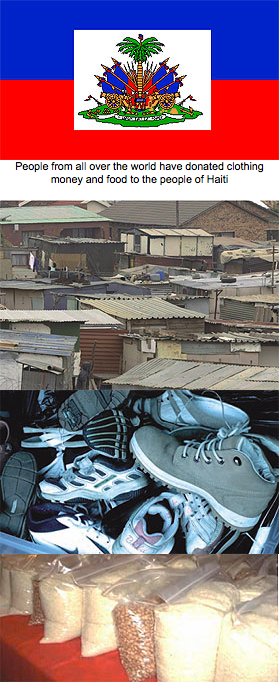 The earthquake that hit Haiti, a Caribbean island in the West Indies, caused major damage destroying almost all of the homes, buildings, churches and schools on the island. The strength of the earthquake measured 7.0 on the Richter scale. The Richter scale is an instrument used internationally to measure the force of earthquakes.
The earthquake that hit Haiti, a Caribbean island in the West Indies, caused major damage destroying almost all of the homes, buildings, churches and schools on the island. The strength of the earthquake measured 7.0 on the Richter scale. The Richter scale is an instrument used internationally to measure the force of earthquakes.
Funds and aid
After the earthquake, people from all over the world joined forces to help the victims and survivors of this tragic disaster.
In South Africa, all relief activities to Haiti will be co-ordinated through a ten-member ministerial committee set up by the Minister for International Relations and Cooperation. Serving on the committee will be the deputy ministers of Social Development, Health, Cooperative Governance and Traditional Affairs, Arts and Culture and Defence and Military Veterans.
The Gift-of-the-Givers, the South African Red Cross Society and Business Unity South Africa will also be represented on the committee.
Rescue SA
The South African government also got together teams of helpers called Rescue South Africa. They were sent to Haiti to join in search and rescue efforts. The first team included engineers, doctors and rescue dogs with medical supplies and emergency medication. They searched six sites including the United Nations headquarters on their first day and rescued thirty people. The second rescue team was made up of forensic pathologists who helped identify bodies of victims.
Gift of the Givers
Government, along with Vodacom, Netcare, Discovery, the SA Red Cross, the Salvation Army and Gift-of-the-Givers, a non-profit organisation, worked for weeks in Haiti to find survivors, help those who were injured and provide food and clothing to those in need.
Gift-of-the-Givers received help from the President's office, the Department of International Relations and Cooperation and the Department of Health.
Gift-of-the-Givers sent out teams of trauma surgeons, paramedics and doctors. They also donated R5 million worth of supplies like tents, blankets, water and medication.
Rebuilding
After seeing shocking images of the destruction in Haiti in newspapers and on television, hundreds of ordinary South Africans also reached out and made donations towards helping to rebuild Haiti.
- Samona Murugan
KEEPING IT BRIEF
KEEPING IT BRIEF sadminNORTH WEST
The days of travelling long distances to decent sports facilities will soon be a thing of the past for the tiny township of Mogwase, near Rustenburg. The first of many Football Turfs of the 2010 World Cup was launched here as part of the World Cup Organising Committee's legacy projects. It is South Africa's biggest grassroots football development programme and involves artificial pitches and development centres in poor communities countrywide.
- BuaNews
EASTERN CAPE
The farming community outside Butterworth is expecting to harvest 5 000 tonnes of maize this season. It is a 200 percent improvement from last year. The community will receive 10 percent of the total harvest. The harvest forms part of the Accelerated and Shared Growth Initiative (AsgiSA) Eastern Cape's integrated dry-land cropping programme. Some 300 households are benefiting from the project in the Butterworth area alone.
- BuaNews
MPUMALANGA
The Minister of Higher Education and Training, Mr Blade Nzimande, has approved the establishment of a university in Mpumalanga. The campus will be based in the capital city, Nelspruit. The main campus will operate alongside a new tertiary hospital to ensure that healthcare will benefit from the university's wealth of research and skills. The provincial government is also looking at ways to overhaul its basic education system.
- BuaNews
KWAZULU-NATAL
The province's Department of Health is to vaccinate about three million children against measles by the end of April. The measles and polio mass immunisation campaign targets all children between six months and 15 years old. It follows an increase in the number of measles cases. Special focus will be on high risk and hard-to-reach areas.
- BuaNews
LIMPOPO
The Limpopo provincial government is planning to provide water to more than one million households by 2011. The focus to provide clean water will be on areas identified as being in distress. This includes the Giyani area where a water pipeline will be constructed from Nandoni, outside Thohoyandou, to Giyani. The provincial government also plans to provide more than one million households with electricity during this period. It will increase the number of people in the province who have access to electricity from 83 to 86 per cent.
- BuaNews
WESTERN CAPE
The provincial Department of Education has set specific targets to improve education outcomes in 2010. The department's plans are aimed at attaining an 80 per cent pass rate in the National Senior Certificate (NSC) exams this year. The provincial Superintendent-General of Education met with eight district directors to develop a detailed plan to achieve this goal.
- BuaNews
For more information about news items featured on this page, call 1020
LETTERS TO THE EDITOR GIVE US A PIECE OF YOUR MIND
LETTERS TO THE EDITOR GIVE US A PIECE OF YOUR MIND sadmin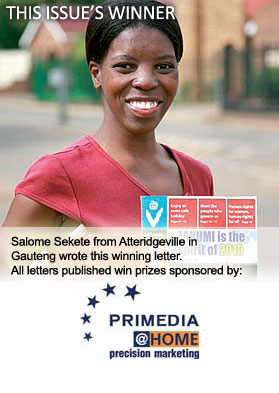 WINNING LETTER
WINNING LETTER
Avoid the crisis of drowning in debt
These days it's crucial to be financially mature. Being unemployed is bad, but being employed can be just as bad if you find yourself in the crisis of drowning in your debts.
That's why we must learn to budget and save. To budget, we must write down our needs for every month and not spend more than we have.
To avoid depression, stress, being blacklisted and repossession, it's best to buy cash or on lay-bye. Lay-bye is useful - you will do your best to pay, because you know the item you are buying is waiting at the shop. You can only have it once you have paid it off, and you will lose it if you don't pay. If you have an account, you get something before you have even paid for it.
- Salome Sekete, Atteridgeville, Gauteng
Leave a remarkable legacy
Many preparations have been made for the 2010 FIFA World Cup and I'm sure South Africa is ready.
South Africa is a multi-cultural society, but regardless of race, sex and beliefs, we all have one thing in common - the way we wear our country's colours.
I call on all South Africans to raise our flag and sing our national anthem deep down from our hearts with pride. Even if Bafana Bafana doesn't make it during the World Cup, let our way of speaking, doing things and our way of wearing our African colours leave a remarkable lasting legacy in the minds of our visitors and future generations.
- Mothupi Ismael, Molatswaneng, North West
Thank you, Kha ri Gude
I'm a 39-year old lady born and bred in Mazizini in Ngqeleni District. I passed grade 12 in 2001 and started teaching Kha ri Gude from April 2008 until now. Kha ri Gude opened doors to my future. Last year I registered for an ABET certificate at UNISA with the assistance of the Kha ri Gude Mass Literacy Campaign. Now I have an ABET certificate. Kha ri Gude is a government mass literacy campaign to help adults who missed out on their schooling.
Kha ri Gude has also provided me with experience through teaching adults in the form of workshops. Thank you to the former Department of Education for the Kha ri Gude campaign!
- Cellinah Mditshane, Ngqeleni, Eastern Cape
Only one precious gift
There is only one precious gift a person can have. It can make your family and society proud of you, it can take you to places you have never been to before, it is permanent and cannot be stolen or be bought, not even from streets, taverns, pubs and shebeens. But you can get it from private and government institutions.
This gift requires dedication, perseverance and commitment. It is guaranteed for permanent use and there is no age limit, you can get it for yourself, it is never too late. It is called "Education".
- Matsebe Charles Nkoana, Alexandra, Gauteng
Use water wisely
We are experiencing a shortage of water in our area, because of a lack of rainfall. We should all learn to use water wisely, because it plays a very significant role in our lives. It is important in generating electricity and essential in our homes.
If we don't use it wisely, it will become unavailable in future. It will affect our industries and our economy. We should think of generations to come, how will they live if we waste all our water. Let's all awake and protect what God has provided for us in order to live.
- Thabo Mosotho, Ficksburg, Free State
Be a role model
Role models are very important while we are growing up. But many young people choose role models, yet do not strive to be like them. Instead, they do the opposite.
Role models should build our confidence, inspire us to achieve the impossible and to work like slaves in order to live like kings and queens. In choosing our role models, we should choose the street lights of our future and then try to be like them. Then, in turn, we can be role models for the next generation.
- Lwazi Mdana, Queenstown, Eastern Cape
Forgiveness frees you
It's hard to forgive those who have wronged us, but we forget that forgiving our enemies sets us free. It may not be easy to live with them, but it can be easy to forgive them. By forgiving them we will be blessed.
No one is always right and there is no pain without gain in life. We all make mistakes which we regret, so let's not judge a book by its cover, let's be patient with other people and act with compassion, because for every action there is a reaction.
- Ramoroka Salome, Steiloop, Limpopo.
Leaving a living legacy
We have all gone through many changes over the past two decades in South Africa. We are privileged to live in one of the most beautiful countries in the world, so smile and be happy, but at the same time start to create your legacy.
A legacy doesn't have to be material things like money, it can be a 'living legacy'. It must reflect who you are as a person and how you improved the lives of others.
- Lassy Mathevula, Krugersdorp, Gauteng
Cheers to SARS
I recently had some difficulty with the completion of my tax return forms. SARS had representatives in our local shopping mall, so I decided to ask for help from them. A young SARS employee looked at my form and my supporting documents and without waste of time he completed my form and e-filed it to SARS. All in just 10 minutes. Cheers to SARS!
- Lynette de Rapper, Uvongo, KwaZulu-Natal
They died for our freedom
Many young people are always finding someone or something to blame for their failures. Instead of correcting our failures, we do nothing but complain or turn to alcohol and cigarettes.
Why are we so lost, why don't we think of those who died for our freedom? They didn't die so we could just give up on life. I think if they could return they would wonder what they died for and ask where the leaders of the future are. Let's not disappoint them.
- Phahlane K.G.C. Ga-Rakgoadi, Limpopo
WRITE TO:
Vuk'uzenzele, Private Bag X745, Pretoria, 0001, or e-mail: vukuzenzele@gcis.gov.za.
If you don't want to have your real name published, you may use a different name, but you must include your real name and address to us.
PLEASE NOTE:
To win a prize, you must include a physical address and a contact telephone number in letters to us.
All letters will get a response.
MANAGING YOUR MONEY NEW LAW TO PROTECT CONSUMERS
MANAGING YOUR MONEY NEW LAW TO PROTECT CONSUMERS sadmin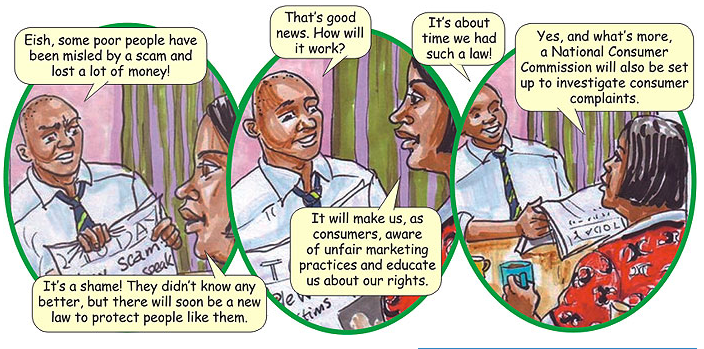
Many South African consumers do not know their rights. This will soon change with the new Consumer Protection Act. This law is aimed at ensuring that as consumers, we are protected against harmful practices and informed about our rights.
South Africans will soon be among the best protected consumers in the world. This is owing to the introduction of a new law, called the Consumer Protection Act, which will be enforced from October this year.
With this law, government wants to ensure that consumers are not misled or harmed by businesses and that they are treated fairly, reasonably and responsibly.
Educate
Until now, South Africans have not been educated about their rights as consumers. As a result, people are often misled and become victims of practices like unfair pricing, scams and direct marketing.
They often sign contracts without understanding what they are signing or buy products without understanding the labels.
Rights
The Department of Trade and Industry (DTI) introduced the new Act to address such problems. The law is aimed at ensuring that we, as consumers, are better protected and educated.
The Act also focuses on clear and understandable language on products and contracts to ensure that consumers understand exactly what they buy or sign.
Consumers' rights include that they must be told all details about the cost and content of goods they buy. In line with the new law, salespersons will have a responsibility to explain in detail the products they are selling. This will ensure that consumers are able to make well-informed buying decisions. It will help them to buy products and services based on honest and fair sales and marketing methods.
Direct marketing
To protect consumers from unfair direct marketing, the law states that as a consumer you have the right to refuse direct marketing.
The law will also give muscle to consumer groups filing complaints on behalf of consumers. Through the Act, accredited consumer groups will give financial support to consumers during legal disputes.
A National Consumer Commission will also be set up to investigate consumer complaints.
Responsibilities
The DTI has started a countrywide publicity campaign to educate consumers about their rights, as well as their responsibilities. The department wants to ensure that everyone understands all aspects of the new Act.
- Mbulelo Baloyi
For more information on the new Consumer Protection Act contact the DTI on 0861 843 384
OUR YOUTH, OUR FUTURE NYDA READY FOR 'YEAR OF ACTION'
OUR YOUTH, OUR FUTURE NYDA READY FOR 'YEAR OF ACTION' sadmin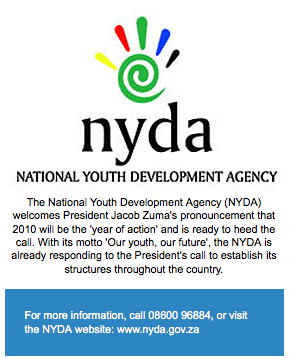 The NYDA, which was launched in June last year, is committed to making a difference in young people's lives. Its main aim is to advance the economic development of young people.
The NYDA, which was launched in June last year, is committed to making a difference in young people's lives. Its main aim is to advance the economic development of young people.
During his State of the Nation address, President Zuma said we needed to invest in our youth as this would ensure a skilled and capable workforce to support growth and job creation. "Last year, we launched the National Youth Development Agency. We have directed the Agency to work faster to establish its structures, throughout the country, so that it can assist us to mainstream youth development programmes within government," he said.
Youth centres
The NYDA is already responding to the President's call to expand its structures throughout the country.
As part of its strategy, it plans to set up Youth Advisory Centres in all the 283 municipalities. This will make their services more accessible, even to people in the most remote rural communities.
Municipalities
"We currently have 113 Youth Advisory Centres at municipalities and we are ready to work faster to establish more structures throughout the country," said NYDA CEO, Steven Ngubeni.
To achieve this, the NYDA needs financial assistance and backing from the municipalities, he said. So far, most municipalities have already shown a keen interest.
Turn the tide
The NYDA is confident that with the pronouncements made by President Zuma and the necessary resources attached to each commitment, the country will soon be ready to turn the tide in the area of youth development.
ROLE MODEL SHOWING THE WORLD WE CARE
ROLE MODEL SHOWING THE WORLD WE CARE sadmin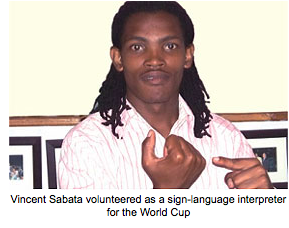 Lehlohonolo Phakedi from Botshabelo Township outside Bloemfontein, had to learn sign language from a young age becuase he was born deaf. Sabata, who is not deaf, learned sign language from deaf people and became so skilled that he ended up being a sign-language interpreter.
Lehlohonolo Phakedi from Botshabelo Township outside Bloemfontein, had to learn sign language from a young age becuase he was born deaf. Sabata, who is not deaf, learned sign language from deaf people and became so skilled that he ended up being a sign-language interpreter.
Raising awareness
Phakedi and Sabata both believe that people should volunteer for the right reasons. Phakedi decided to volunteer for the World Cup to create awareness about deafness and to show visitors that South Africans care.
"I want people to understand that deaf people are just like everybody else. They are capable of doing anything," he said.
Sabata, who supports Phakedi's views, said he volunteered to be a sign-language interpreter to raise awareness about communication between deaf people and those who can hear. "Together, we want to show the rest of the world that South Africans care for all their visitors. We also want to show the world our country's ability to involve different people, including those with disabilities, in major projects such as the FIFA World Cup," Sabata said.
"Volunteers must be committed and have passion for what they do. Money should not be the only motivating factor when you offer your services."
Commitment
Apart from the World Cup, the two Bloemfontein-based sign-language interpreters both worked as volunteers during the Confederations Cup in June last year. Phakedi did administrative work, while Sabata worked as a sign-language interpreter.
Sabata has attended several training courses in sign-language interpreting. These have been offered by the National Deaf Service Institute of South Africa and the Deaf Federation of South Africa, where Sabata works as a volunteer.
Volunteer work
In his free time, Sabata also works as a volunteer for the Free State Department of Sports, Arts and Culture helping deaf people who work there. The Pan South African Language Board (PANSALB) has offered Sabata a bursary to study for a sign-language qualification at the University of the Free State.
Phakedi does volunteer work as a receptionist and administrator at the offices of the Free State Deaf Association. He is also chairperson of the Botshabelo branch of the Free State Deaf Association.
- Mbulelo Baloyi
Two young Free State men want to show the world that South Africans care equally for all their visitors. They also want to raise awareness about communication between deaf people and those who can hear.
Lehlohonolo Phakedi and Vincent Sabata will be sign-language interpreters for people with hearing disabilities during the FIFA World Cup. They have been selected from thousands of applicants who volunteered their rare skills for the tournament.
SPECIAL EDITION FEATURE GOVERNMENT'S PROGRAMME OF ACTION 2010
SPECIAL EDITION FEATURE GOVERNMENT'S PROGRAMME OF ACTION 2010 sadmin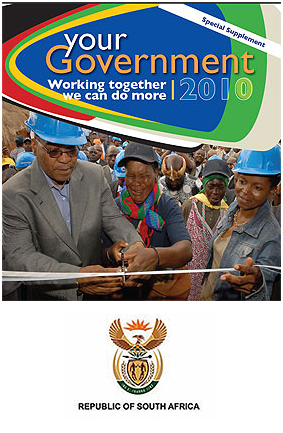 The State of the Nation Address
The State of the Nation Address
On 11 February 2010, President Jacob Zuma made his annual State of the Nation Address, which outlines government's Programme of Action, or its plans and priorities for the year ahead. In addition, government will also work harder towards improving local government, infrastructure development and human settlements.
THE RICA ACT REGISTER YOUR CELLPHONE TO HELP PREVENT CRIME
THE RICA ACT REGISTER YOUR CELLPHONE TO HELP PREVENT CRIME sadmin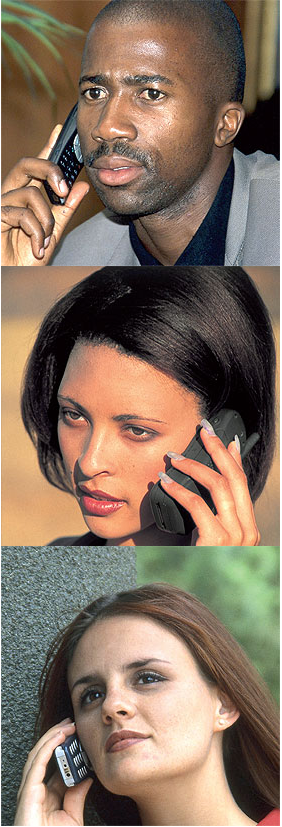 All people using cellphones have until the end of the year to register their SIM cards and personal details. This is in line with the RICA Act. RICA is short for Regulation of Interception of Communications and Provision of Communication-Related Information Act. It will help prevent criminals from using cellphones for illegal activities.
All people using cellphones have until the end of the year to register their SIM cards and personal details. This is in line with the RICA Act. RICA is short for Regulation of Interception of Communications and Provision of Communication-Related Information Act. It will help prevent criminals from using cellphones for illegal activities.
Criminals often use cellphones when planning and committing crimes. These include cash heists, bank robberies, house robberies and violent crimes.
The new law, which came into effect from 1 July 2009, will help the police to track down criminals' personal details from their cellphone numbers.
According to the RICA Act, all SIM card users, operators and service providers must register each SIM card with the owner's personal details.
All information will be kept confidential in a secure database and cannot be used for any purpose other than the purposes allowed under the RICA Act.
Easy and free
To register your SIM card is easy and free.
You can register at most stores where you buy a starter pack. To register your SIM card, you have to provide your full name and surname, your cellphone number and identity document.
You must also give proof of your physical address. This is any document like a bank statement, insurance policy, TV or vehicle licence that has your name and address on it.
Safe and secure
If you live in an informal settlement you can provide a letter or affidavit from your nearest school, church or store from where you receive your post.
The letter must be on an official letterhead and have a stamp from the school or church.
All your personal details will be kept in a safe and secure database.
New SIM cards
All new SIM cards must be registered to be activated.
People using older SIM cards will have until 31 December 2010 to register them.
SIM cards that are not registered before 31 December 2010 will be disconnected until they are registered.
- Samona Murugan
- RICA is a legal requirement from government and everyone with a cellphone number in South Africa must obey the law.
- By doing so, you can help to make South Africa a safer place. This law aims to help law enforcement agencies to identify the users of cellphone numbers and track criminals using cellphones for illegal activities.
VISION 2025 PLANNING THE FUTURE WITH A VISION
VISION 2025 PLANNING THE FUTURE WITH A VISION sadmin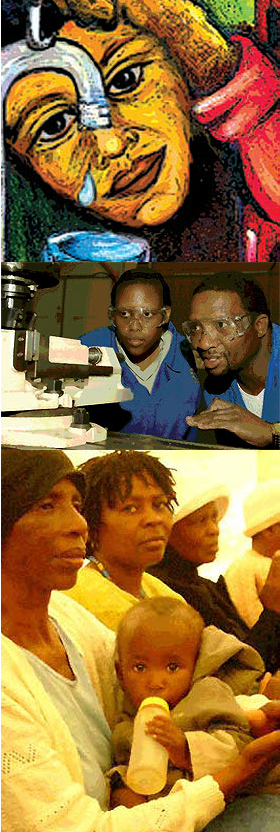 When the new administration under President Jacob Zuma came into office last year, the Presidency decided to set up a National Planning Commission. It will plan development over a long period into the future to help government provide better service to the people.
When the new administration under President Jacob Zuma came into office last year, the Presidency decided to set up a National Planning Commission. It will plan development over a long period into the future to help government provide better service to the people.
Government's Planning Commission will co-operate with different levels of government, as well as with non-governmental organisations and professional bodies. They will work together to plan goals to be achieved over 15 years.
15-year plan
Government became aware that a five-year period between elections was too short to finish the main objective of building a prosperous, non-racial, non-sexist, democratic society. The commission is therefore working on a 15-year plan called Vision 2025.
The Vision 2025 plan will show government what kind of society all South Africans would like to see in 15 years' time.
Government will use this plan as a guide in achieving its objectives for the nation. It will set out the main goals in relation to social, economic and political development.
Some of the questions that need to be answered by the 15-year plan are:
- How far will government have reduced poverty and inequality?
- How many people will be employed in what kind of jobs, and how will government care for the remaining unemployed?
- How much will violent crime be reduced, and how will government achieve this objective?
- How much will the health system be improved, and how low will the rates of TB and HIV and AIDS infection fall?
- How many children will finish school and how many will go to colleges and universities?
- How many of South Africans will need private vehicles to get to school and to work, and how will the public transport system operate?
- Where will most South Africans be living? How many people would have moved from rural areas to the cities and how will government plan for that? In other words, by how much will government expect the contribution and wealth of rural areas to improve?
- What will the average economic growth rate be to allow South Africa to achieve its other goals, and how will it reach that growth rate?
Skills and jobs
In addition to planning, Government will also do research on issues like food security and climate change, as well as skills development and job creation.
- Mbulelo Baloyi
With Vision 2025, government can confidently plan for the future with solid guidelines and a clear vision.
WATER AFFAIRS BRIGHTEN YOUR FUTURE WITH A BURSARY
WATER AFFAIRS BRIGHTEN YOUR FUTURE WITH A BURSARY sadmin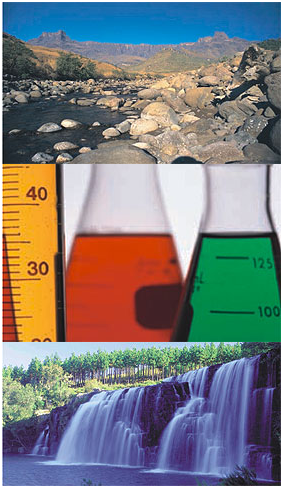 If you are in matric and your future looks bleak because you have no money for further studies, don't give up hope. The Department of Water Affairs can help you brighten your future with a bursary.
If you are in matric and your future looks bleak because you have no money for further studies, don't give up hope. The Department of Water Affairs can help you brighten your future with a bursary.
If you are interested in careers such as engineering, biochemistry and environmental sciences and if you love subjects like Maths, Science and Physics, you may find a future career with the Department of Water Affairs. The department has a learning academy where you can apply for a bursary to further your studies in these fields.
They are offering bursaries for 2011 in over 30 fields of study.
These fields include:
Water and Sanitation
This is the study of water sources. Sanitation deals with the collection of waste from toilets and waste water in homes and communities and how it is treated and disposed of.
Limnology and Aquatic Science
This is the study of the Physics, Chemistry and Biology of inland waters such as rivers, dams and lakes.
Surveying and Cartography
Using Geometry, Engineering, Trigonometry, Mathematics and Physics to study points and distances, as well as the angles between them.
Such information is used to create maps and boundaries for government purposes.
Geology, Geo-hydrology and Hydrology
Geology is the science and study of the solid and liquid matter on earth. It focuses on the history and materials on earth, such as how they were made, formed and changed. It also focuses on climate change and environments.
Geo-hydrology and Hydrology studies how water is distributed.
Civil, Electrical, Mechanical and Chemical Engineering
Civil Engineering focuses on the design, construction and maintenance of bridges, roads, canals, dams, buildings etc.
Electrical Engineering is the study of electricity and electronics.
Mechanical Engineering uses Science and Physics to study the power and production of machines and tools.
Biochemistry, Analytical Chemistry and Microbiology
These fields focus on Chemistry, Physics and Science and how it affects and creates living organisms.
Forestry Conservation, Horticulture
These relate to the study of plant life using Science and Biology to examine soil and growing of seeds.
Environmental Science, Environmental Management and Environmental Law
The study of how social sciences, Physics, Biology and Geography affect humans, animals and other organisms. Environmental management focuses on managing and protecting the environment.
- Samona Murugan
To qualify, you must have an interest in Maths, Science or Biology with good grades in your matric exams. You can collect bursary application forms from the universities of Pretoria, KwaZulu-Natal, Free State, Cape Town, Stellenbosch, Western Cape and Limpopo, as well as the Nelson Mandela Metropolitan University, the Walter Sisulu University and the Tshwane, Durban and Central universities of technology.